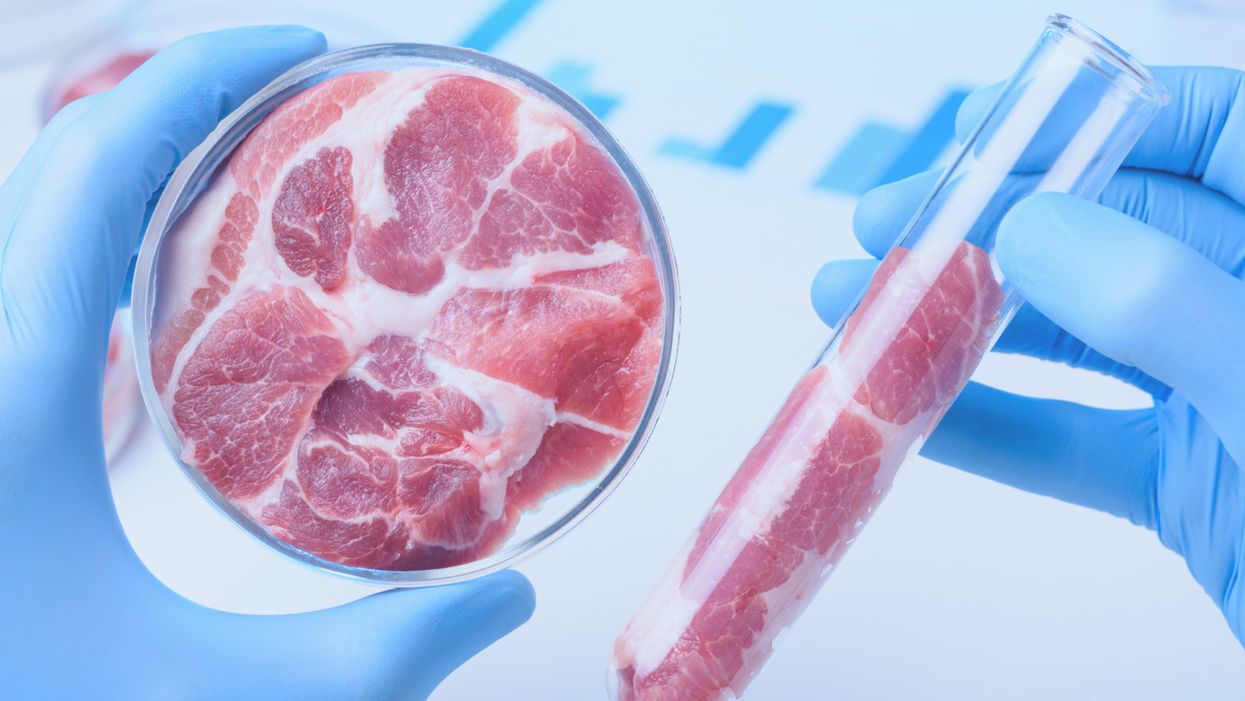Can Cultured Meat Save the Planet?

Lab-grown meat in a Petri dish and test tube.
In September, California governor Jerry Brown signed a bill mandating that by 2045, all of California's electricity will come from clean power sources. Technological breakthroughs in producing electricity from sun and wind, as well as lowering the cost of battery storage, have played a major role in persuading Californian legislators that this goal is realistic.
Even if the world were to move to an entirely clean power supply, one major source of greenhouse gas emissions would continue to grow: meat.
James Robo, the CEO of the Fortune 200 company NextEra Energy, has predicted that by the early 2020s, electricity from solar farms and giant wind turbines will be cheaper than the operating costs of coal-fired power plants, even when the cost of storage is included.
Can we therefore all breathe a sigh of relief, because technology will save us from catastrophic climate change? Not yet. Even if the world were to move to an entirely clean power supply, and use that clean power to charge up an all-electric fleet of cars, buses and trucks, one major source of greenhouse gas emissions would continue to grow: meat.
The livestock industry now accounts for about 15 percent of global greenhouse gas emissions, roughly the same as the emissions from the tailpipes of all the world's vehicles. But whereas vehicle emissions can be expected to decline as hybrids and electric vehicles proliferate, global meat consumption is forecast to be 76 percent greater in 2050 than it has been in recent years. Most of that growth will come from Asia, especially China, where increasing prosperity has led to an increasing demand for meat.
Changing Climate, Changing Diets, a report from the London-based Royal Institute of International Affairs, indicates the threat posed by meat production. At the UN climate change conference held in Cancun in 2010, the participating countries agreed that to allow global temperatures to rise more than 2°C above pre-industrial levels would be to run an unacceptable risk of catastrophe. Beyond that limit, feedback loops will take effect, causing still more warming. For example, the thawing Siberian permafrost will release large quantities of methane, causing yet more warming and releasing yet more methane. Methane is a greenhouse gas that, ton for ton, warms the planet 30 times as much as carbon dioxide.
The quantity of greenhouse gases we can put into the atmosphere between now and mid-century without heating up the planet beyond 2°C – known as the "carbon budget" -- is shrinking steadily. The growing demand for meat means, however, that emissions from the livestock industry will continue to rise, and will absorb an increasing share of this remaining carbon budget. This will, according to Changing Climate, Changing Diets, make it "extremely difficult" to limit the temperature rise to 2°C.
One reason why eating meat produces more greenhouse gases than getting the same food value from plants is that we use fossil fuels to grow grains and soybeans and feed them to animals. The animals use most of the energy in the plant food for themselves, moving, breathing, and keeping their bodies warm. That leaves only a small fraction for us to eat, and so we have to grow several times the quantity of grains and soybeans that we would need if we ate plant foods ourselves. The other important factor is the methane produced by ruminants – mainly cattle and sheep – as part of their digestive process. Surprisingly, that makes grass-fed beef even worse for our climate than beef from animals fattened in a feedlot. Cattle fed on grass put on weight more slowly than cattle fed on corn and soybeans, and therefore do burp and fart more methane, per kilogram of flesh they produce.
Richard Branson has suggested that in 30 years, we will look back on the present era and be shocked that we killed animals en masse for food.
If technology can give us clean power, can it also give us clean meat? That term is already in use, by advocates of growing meat at the cellular level. They use it, not to make the parallel with clean energy, but to emphasize that meat from live animals is dirty, because live animals shit. Bacteria from the animals' guts and shit often contaminates the meat. With meat cultured from cells grown in a bioreactor, there is no live animal, no shit, and no bacteria from a digestive system to get mixed into the meat. There is also no methane. Nor is there a living animal to keep warm, move around, or grow body parts that we do not eat. Hence producing meat in this way would be much more efficient, and much cleaner, in the environmental sense, than producing meat from animals.
There are now many startups working on bringing clean meat to market. Plant-based products that have the texture and taste of meat, like the "Impossible Burger" and the "Beyond Burger" are already available in restaurants and supermarkets. Clean hamburger meat, fish, dairy, and other animal products are all being produced without raising and slaughtering a living animal. The price is not yet competitive with animal products, but it is coming down rapidly. Just this week, leading officials from the Food and Drug Administration and the U.S. Department of Agriculture have been meeting to discuss how to regulate the expected production and sale of meat produced by this method.
When Kodak, which once dominated the sale and processing of photographic film, decided to treat digital photography as a threat rather than an opportunity, it signed its own death warrant. Tyson Foods and Cargill, two of the world's biggest meat producers, are not making the same mistake. They are investing in companies seeking to produce meat without raising animals. Justin Whitmore, Tyson's executive vice-president, said, "We don't want to be disrupted. We want to be part of the disruption."
That's a brave stance for a company that has made its fortune from raising and killing tens of billions of animals, but it is also an acknowledgement that when new technologies create products that people want, they cannot be resisted. Richard Branson, who has invested in the biotech company Memphis Meats, has suggested that in 30 years, we will look back on the present era and be shocked that we killed animals en masse for food. If that happens, technology will have made possible the greatest ethical step forward in the history of our species, saving the planet and eliminating the vast quantity of suffering that industrial farming is now inflicting on animals.
Time to visit your TikTok doc? The good and bad of doctors on social media
Rakhi Patel is among an increasing number of health care professionals, including doctors and nurses, who maintain an active persona on Instagram, TikTok and other social media sites.
Rakhi Patel has carved a hobby out of reviewing pizza — her favorite food — on Instagram. In a nod to her preferred topping, she calls herself thepepperoniqueen. Photos and videos show her savoring slices from scores of pizzerias. In some of them, she’s wearing scrubs — her attire as an inpatient neurology physician associate at Tufts Medical Center in Boston.
“Depending on how you dress your pizza, it can be more nutritious,” said Patel, who suggests a thin crust, sugarless tomato sauce and vegetables galore as healthier alternatives. “There are no boundaries for a health care professional to enjoy pizza.”
Beyond that, “pizza fuels my mental health and makes me happy, especially when loaded with pepperoni,” she said. “If I’m going to be a pizza connoisseur, then I also need to take care of my physical health by ensuring that I get at least three days of exercise per week and eat nutritiously when I’m not eating pizza.”
She’s among an increasing number of health care professionals, including doctors and nurses, who maintain an active persona on social media, according to bioethics researchers. They share their hobbies and interests with people inside and outside the world of medicine, helping patients and the public become acquainted with the humans behind the scrubs or white coats. Other health care experts limit their posts to medical topics, while some opt for a combination of personal and professional commentaries. Depending on the posts, ethical issues may come into play.
“Health care professionals are quite prevalent on social media,” said Mercer Gary, a postdoctoral researcher at The Hastings Center, an independent bioethics research institute in Garrison, New York. “They’ve been posting on #medTwitter for many years, mainly to communicate with one another, but, of course, anyone can see the threads. Most recently, doctors and nurses have become a presence on TikTok.”
On social media, many health care providers perceive themselves to be “humanizing” their profession by coming across as more approachable — “reminding patients that providers are people and workers, as well as repositories of medical expertise,” Gary said. As a result, she noted that patients who are often intimidated by clinicians may feel comfortable enough to overcome barriers to scheduling health care appointments. The use of TikTok in particular may help doctors and nurses connect with younger followers.
When health care providers post on social media, they must bear in mind that they have legal and ethical duties to their patients, profession and society, said Elizabeth Levy, founder and director of Physicians for Justice.
While enduring three years of pandemic conditions, many health care professionals have struggled with burnout, exhaustion and moral distress. “Much health care provider content on social media seeks to expose the difficulties of the work,” Gary added. “TikTok and Instagram reels have shown health care providers crying after losing a patient or exhausted after a night shift in the emergency department.”
A study conducted in Beijing, China and published last year found that TikTok is the world’s most rapidly growing video application, amassing 1.6 billion users in 2021. “More and more patients are searching for information on genitourinary cancers via TikTok,” the study’s authors wrote in Frontiers in Oncology, referring to cancers of the urinary tracts and male reproductive organs. Among the 61 sample videos examined by the researchers, health care practitioners contributed the content in 29, or 47 percent, of them. Yet, 22 posts, 36 percent, were misinformative, mostly due to outdated information.
More than half of the videos offered good content on disease symptoms and examinations. The authors concluded that “most videos on genitourinary cancers on TikTok are of poor to medium quality and reliability. However, videos posted by media agencies enjoyed great public attention and interaction. Medical practitioners could improve the video quality by cooperating with media agencies and avoiding unexplained terminologies.”
When health care providers post on social media, they must bear in mind that they have legal and ethical duties to their patients, profession and society, said Elizabeth Levy, founder and director of Physicians for Justice in Irvine, Calif., a nonprofit network of volunteer physicians partnering with public interest lawyers to address the social determinants of health.
“Providers are also responsible for understanding the mechanics of their posts,” such as who can see these messages and how long they stay up, Levy said. As a starting point for figuring what’s acceptable, providers could look at social media guidelines put out by their professional associations. Even beyond that, though, they must exercise prudent judgment. “As social media continues to evolve, providers will also need to stay updated with the changing risks and benefits of participation.”
Patients often research their providers online, so finding them on social media can help inform about values and approaches to care, said M. Sara Rosenthal, a professor and founding director of the program for bioethics and chair of the hospital ethics committee at the University of Kentucky College of Medicine.
Health care providers’ posts on social media also could promote patient education. They can advance informed consent and help patients navigate the risks and benefits of various treatments or preventive options. However, providers could violate ethical principles if they espouse “harmful, risky or questionable therapies or medical advice that is contrary to clinical practice guidelines or accepted standards of care,” Rosenthal said.
Inappropriate self-disclosure also can affect a provider’s reputation, said Kelly Michelson, a professor of pediatrics and director of the Center for Bioethics and Medical Humanities at Northwestern University’s Feinberg School of Medicine. A clinician’s obligations to professionalism extend beyond those moments when they are directly taking care of their patients, she said. “Many experts recommend against clinicians ‘friending’ patients or the families on social media because it blurs the patient-clinician boundary.”
Meanwhile, clinicians need to adhere closely to confidentiality. In sharing a patient’s case online for educational purposes, safeguarding identity becomes paramount. Removing names and changing minor details is insufficient, Michelson said.
“The patient-clinician relationship is sacred, and it can only be effective if patients have 100 percent confidence that all that happens with their clinician is kept in the strictest of confidence,” she said, adding that health care providers also should avoid obtaining information about their patients from social media because it can lead to bias and risk jeopardizing objectivity.
Academic clinicians can use social media as a recruitment tool to expand the pool of research participants for their studies, Michelson said. Because the majority of clinical research is conducted at academic medical centers, large segments of the population are excluded. “This affects the quality of the data and knowledge we gain from research,” she said.
Don S. Dizon, a professor of medicine and surgery at the Warren Alpert Medical School of Brown University in Providence, Rhode Island, uses LinkedIn and Doximity, as well as Twitter, Instagram, TikTok, Facebook, and most recently, YouTube and Post. He’s on Twitter nearly every day, where he interacts with the oncology community and his medical colleagues.
Also, he said, “I really like Instagram. It’s where you will see a hybrid of who I am professionally and personally. I’ve become comfortable sharing both up to a limit, but where else can I combine my appreciation of clothes with my professional life?” On that site, he’s seen sporting shirts with polka dots or stripes and an occasional bow-tie. He also posts photos of his cats.

Don S. Dizon, a professor of medicine and surgery at Brown, started using TikTok several years ago, telling medical stories in short-form videos.
Don S. Dizon
Dizon started using TikTok several years ago, telling medical stories in short-form videos. He may talk about an inspirational patient, his views on end-of-life care and death, or memories of people who have passed. But he is careful not to divulge any details that would identify anyone.
Recently, some people have become his patients after viewing his content on social media or on the Internet in general, which he clearly states isn’t a forum for medical advice. “In both situations, they are so much more relaxed when we meet, because it’s as if they have a sense of who I am as a person,” Dizon said. “I think that has helped so much in talking through a cancer diagnosis and a treatment plan, and yes, even discussions about prognosis.”
He also posts about equity and diversity. “I have found myself more likely to repost or react to issues that are inherently political, including racism, homophobia, transphobia and lack-of-access issues, because medicine is not isolated from society, and I truly believe that medicine is a social justice issue,” said Dizon, who is vice chair of diversity, equity, inclusion and professional integrity at the SWOG Cancer Research Network.
Through it all, Dizon likes “to break through the notion of doctor as infallible and all-knowing, the doctor as deity,” he said. “Humanizing what I do, especially in oncology, is something that challenges me on social media, and I appreciate the opportunities to do it on TikTok.”
Could this habit related to eating slow down rates of aging?
Previous research showed that restricting calories results in longer lives for mice, worms and flies. A new study by Columbia University researchers applied those findings to people. But what does this paper actually show?
Last Thursday, scientists at Columbia University published a new study finding that cutting down on calories could lead to longer, healthier lives. In the phase 2 trial, 220 healthy people without obesity dropped their calories significantly and, at least according to one test, their rate of biological aging slowed by 2 to 3 percent in over a couple of years. Small though that may seem, the researchers estimate that it would translate into a decline of about 10 percent in the risk of death as people get older. That's basically the same as quitting smoking.
Previous research has shown that restricting calories results in longer lives for mice, worms and flies. This research is unique because it applies those findings to people. It was published in Nature Aging.
But what did the researchers actually show? Why did two other tests indicate that the biological age of the research participants didn't budge? Does the new paper point to anything people should be doing for more years of healthy living? Spoiler alert: Maybe, but don't try anything before talking with a medical expert about it. I had the chance to chat with someone with inside knowledge of the research -- Dr. Evan Hadley, director of the National Institute of Aging's Division of Geriatrics and Clinical Gerontology, which funded the study. Dr. Hadley describes how the research participants went about reducing their calories, as well as the risks and benefits involved. He also explains the "aging clock" used to measure the benefits.

Evan Hadley, Director of the Division of Geriatrics and Clinical Gerontology at the National Institute of Aging
NIA

